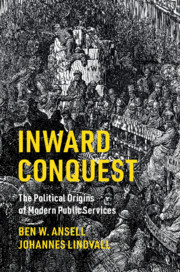Refine search
Actions for selected content:
18 results
25 - The Enjoyment and Exercise of Rights and Freedoms Regime
- from Title 7 - International Legal Regime of Human Rights and Freedoms
-
- Book:
- International Human Rights Law
- Published online:
- 10 April 2025
- Print publication:
- 01 May 2025, pp 503-536
-
- Chapter
- Export citation
Reconciling Divergent Meanings in the Interpretation of Multilingual Treaties
-
- Journal:
- International & Comparative Law Quarterly / Volume 74 / Issue 2 / April 2025
- Published online by Cambridge University Press:
- 08 August 2025, pp. 467-484
- Print publication:
- April 2025
-
- Article
-
- You have access
- Open access
- HTML
- Export citation
6 - Ad libitum Use of Constitutional Concepts
-
- Book:
- Constitutional Intolerance
- Published online:
- 09 January 2025
- Print publication:
- 23 January 2025, pp 87-103
-
- Chapter
- Export citation
4 - Transformation in Policing Minor Offending in China
- from Part II - Authoritarian Policing: Past and Present
-
-
- Book:
- Regime Type and Beyond
- Published online:
- 25 May 2023
- Print publication:
- 08 June 2023, pp 87-119
-
- Chapter
- Export citation
7 - Democracy and International Investment Law
- from Part II - Public Law Questions Relating to Arbitration
-
-
- Book:
- Cambridge Compendium of International Commercial and Investment Arbitration
- Published online:
- 18 February 2023
- Print publication:
- 02 March 2023, pp 186-210
-
- Chapter
- Export citation
Official discretion, errors, and oversights: legal bureaucracy and the question of justice in twentieth-century India
-
- Journal:
- Journal of the Royal Asiatic Society / Volume 33 / Issue 2 / April 2023
- Published online by Cambridge University Press:
- 08 November 2022, pp. 389-400
- Print publication:
- April 2023
-
- Article
- Export citation
3 - Jus Temporis or the Immigrant’s Right to Human Time
-
- Book:
- Grasping Legal Time
- Published online:
- 09 June 2022
- Print publication:
- 23 June 2022, pp 65-96
-
- Chapter
- Export citation
The Contested Right of Public Meeting in England from the Bill of Rights to the Public Order Acts
-
- Journal:
- Transactions of the Royal Historical Society / Volume 32 / December 2022
- Published online by Cambridge University Press:
- 23 March 2022, pp. 199-221
- Print publication:
- December 2022
-
- Article
-
- You have access
- Open access
- HTML
- Export citation
2 - Order Invisible
- from Part I - Nocturnal Realities
-
- Book:
- As Night Falls
- Published online:
- 27 July 2021
- Print publication:
- 01 July 2021, pp 46-80
-
- Chapter
- Export citation
Public order as a protectable interest
-
- Journal:
- Legal Studies / Volume 41 / Issue 3 / September 2021
- Published online by Cambridge University Press:
- 26 March 2021, pp. 410-429
- Print publication:
- September 2021
-
- Article
- Export citation
3 - “An Evil Quarter of an Hour about the Precincts”
-
- Book:
- Armed with Sword and Scales
- Published online:
- 05 February 2021
- Print publication:
- 04 February 2021, pp 141-174
-
- Chapter
- Export citation
3 - The Police
- from Part II - Order
-
- Book:
- Inward Conquest
- Published online:
- 12 November 2020
- Print publication:
- 26 November 2020, pp 63-90
-
- Chapter
- Export citation
4 - Prisons
- from Part II - Order
-
- Book:
- Inward Conquest
- Published online:
- 12 November 2020
- Print publication:
- 26 November 2020, pp 91-116
-
- Chapter
- Export citation

Inward Conquest
- The Political Origins of Modern Public Services
-
- Published online:
- 12 November 2020
- Print publication:
- 26 November 2020
Constitutional Migration and the Meaning of Religious Freedom: From Ireland and India to the Islamic Republic of Pakistan
-
- Journal:
- The Journal of Asian Studies / Volume 79 / Issue 1 / February 2020
- Published online by Cambridge University Press:
- 05 November 2019, pp. 129-154
- Print publication:
- February 2020
-
- Article
- Export citation
Comforted But Not Compensated? Mourners and Funeral Picketing in English Law
-
- Journal:
- Ecclesiastical Law Journal / Volume 17 / Issue 3 / September 2015
- Published online by Cambridge University Press:
- 01 September 2015, pp. 283-294
- Print publication:
- September 2015
-
- Article
- Export citation
TO RANT, VENT AND CONVERSE: PROTECTING LOW LEVEL DIGITAL SPEECH
-
- Journal:
- The Cambridge Law Journal / Volume 71 / Issue 2 / July 2012
- Published online by Cambridge University Press:
- 15 June 2012, pp. 355-383
- Print publication:
- July 2012
-
- Article
- Export citation
A different sense of humanity: occupation in Francis Lieber's Code
-
- Journal:
- International Review of the Red Cross / Volume 94 / Issue 885 / March 2012
- Published online by Cambridge University Press:
- 10 October 2012, pp. 81-116
- Print publication:
- March 2012
-
- Article
- Export citation
